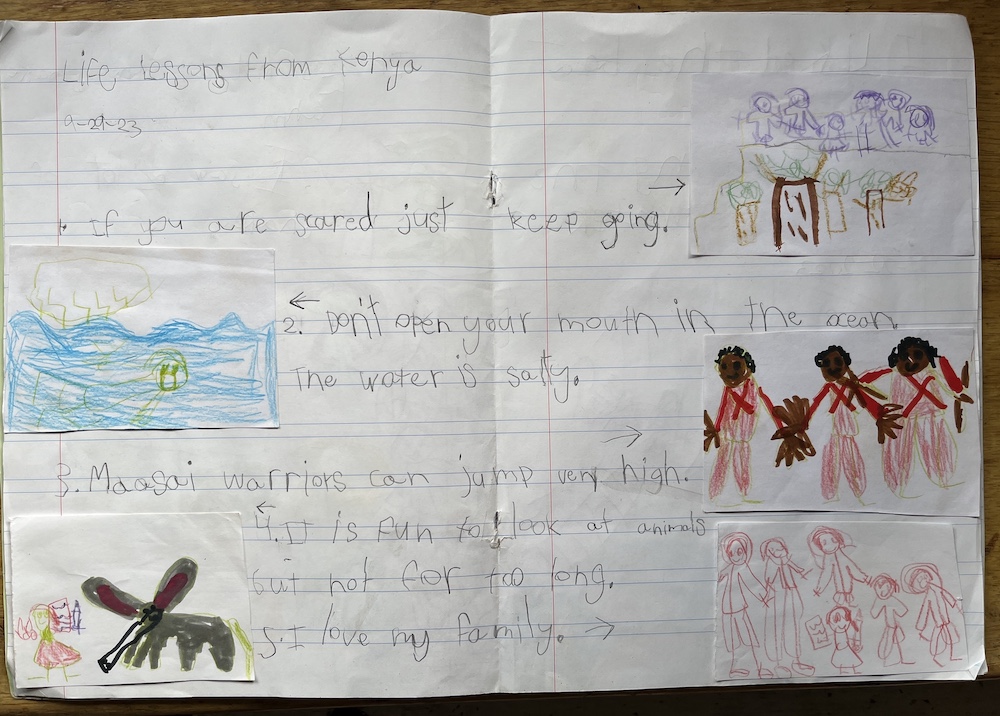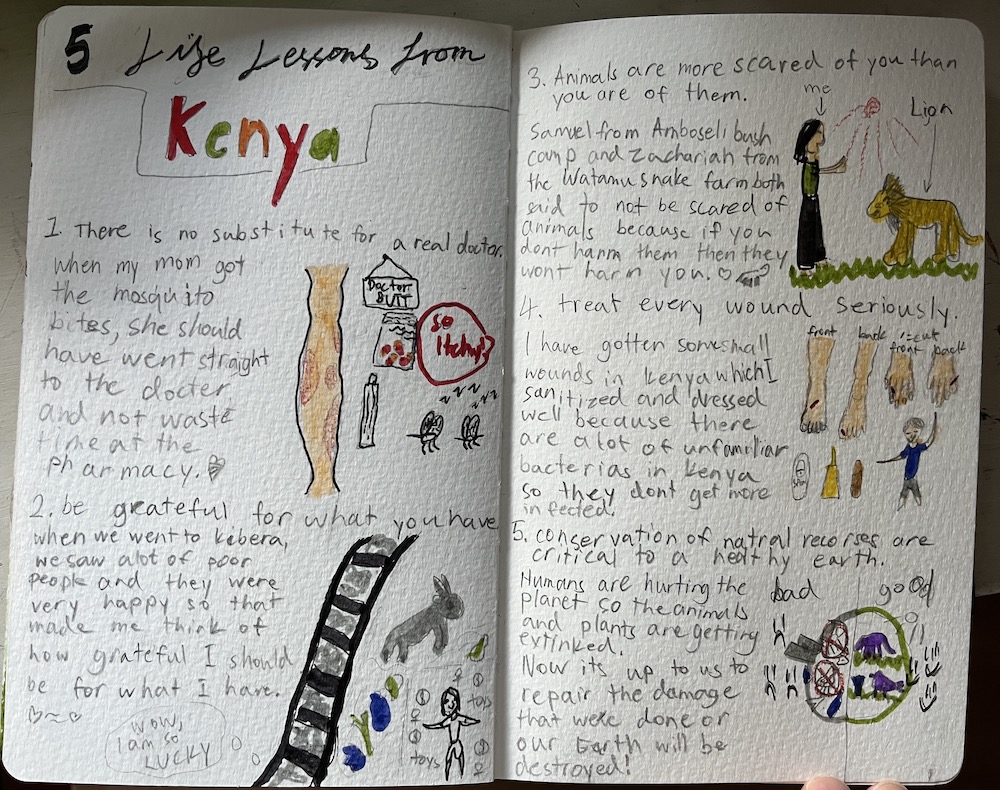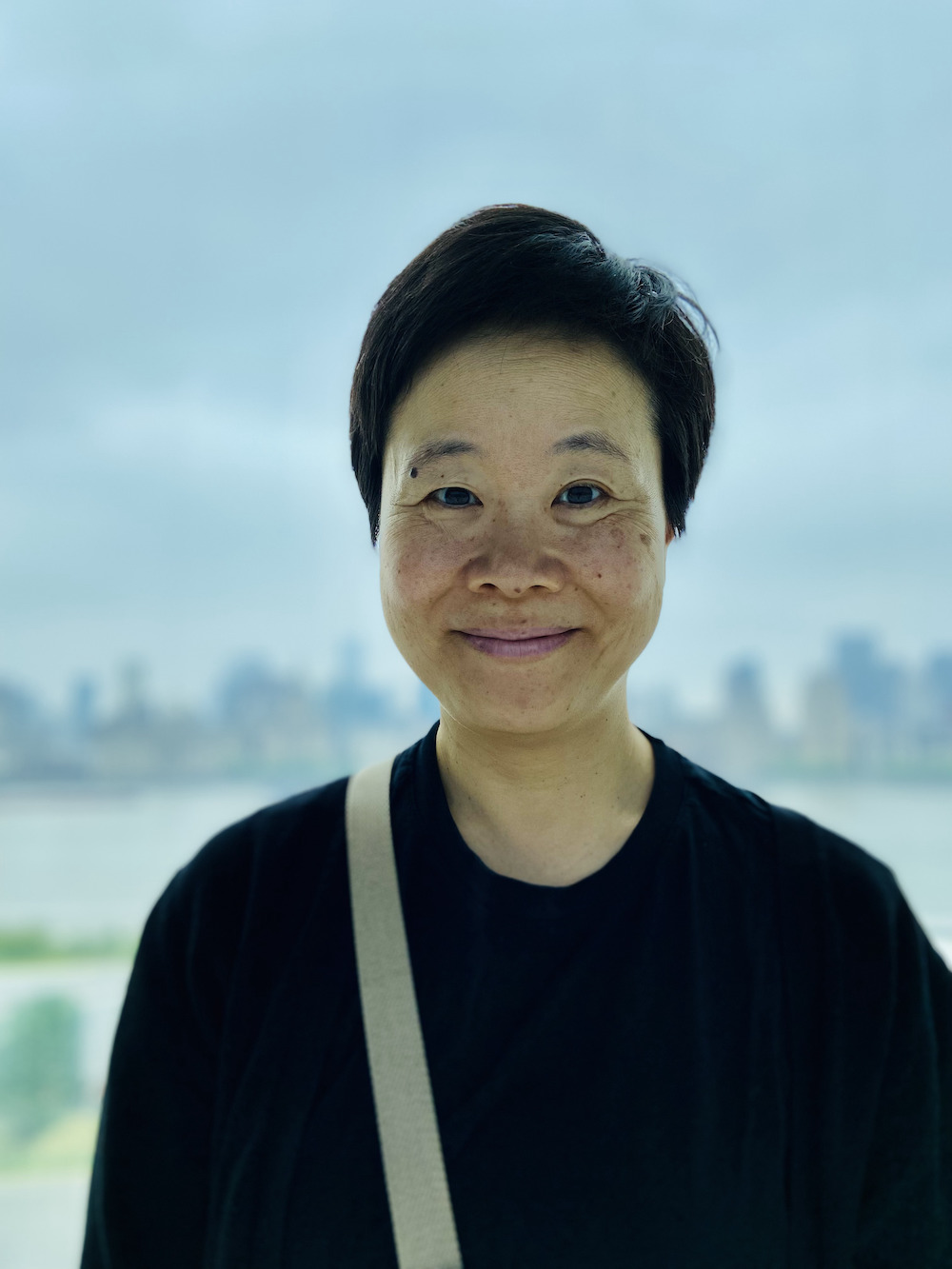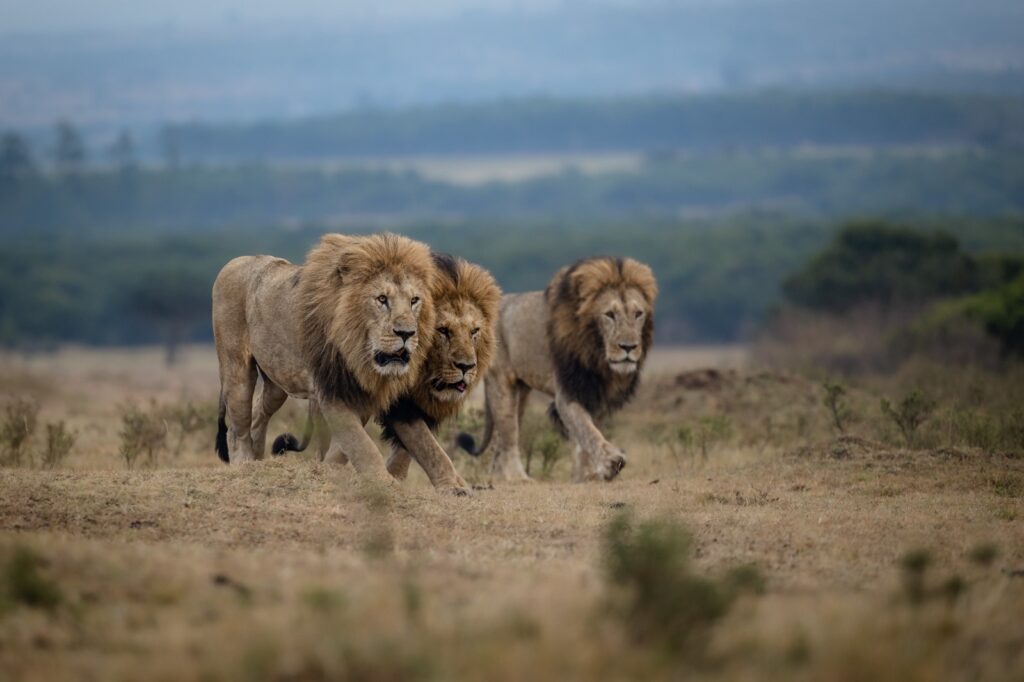Kenya is a beautiful country, rich with natural resources and wildlife, with people who are warm and proud despite not having much. We have admired the majestic beauty of wild animals in their natural habitat and observed the delicate balance of nature. We have seen the harm caused by man and the effect on animal and plant species that have become endangered and extinct. We have learned about the importance of conservation and studied successful conservation models. We have connected and made friends with people who come from very different cultures and ways of life. As a family, we have experienced overwhelming joy and exhilaration and also faced challenges, unexpected situations and disappointments.
Each of us has grown as individuals and internalized the experiences of this month in Kenya in our own unique way. Toward the end of our month here, we began a conversation to explore and discuss what impacted us the most and left the deepest, most lasting impression. For all six of us, Kenya is etched in our memories and in our hearts.
Each of our “Life Lessons from Kenya” in order from youngest to oldest.
EY's Life Lessons from Kenya

DY's Life Lessons from Kenya
1. Don’t choose a bad chicken for a BBQ.
One day we were buying a chicken for dinner and we thought it was going to be tender and good but…it wasn’t. Because you are suppose to get a young hen not an old grumpy chicken.
2. Don’t block the fire’s oxygen.
One night my brother and dad.aka.Bobby built a big fire but Bobby put a big log on the top of the fire and it blocked the fire’s oxygen and then BBRTTR.aka.BIG BRO RAND TO THE RESCUE!!!! And BIG BRO RAND saved the day!!
3. Protect nature or it will all be gone.
Every place we have visited in Kenya have different kinds of endangered animals for example the northern white rhino’s or the or the chimps African elephants or the Rothschild giraffes or the Green sea turtles and the Hawksbill turtles and a lot more. The reason why those animals are endangered is because of poaching and habitat loss. If man kind keeps on poaching there will be nothing left except for dust and blood.
4. Nature has everything you need
Since we’ve been in a Amboseli, nature has been providing us with natural resources like Water to drink,earth to grow food,fire to stay warm and air to breathe. We even have ENTERTAINMENT like watching the stars!!
5. When you are tired it is (not) best to complain.
One day in Nanuki we had a chance to hike mount Kenya I thought it would be fun but unfortunately it wasn’t so I complained the whole time. I am not proud of this so I hope you won’t make the same mistake as I did. I will try to not complain so much next time.
AY's Life Lessons from kenya
1. There is no substitute for a real doctor.
My mom had a bad leg allergy from mosquito bites so she went to the pharmacy. The pharmacist gave her a medicine. After a few days, it was clear that it wasn’t working. So she went back and another pharmacist said to take this other medicine. It also didn’t work. At last, she went to a real doctor and the doctor said these medicines prescribed by the pharmacist are not right. He gave my mom the correct medicines and it started to work right away and now it’s getting better.
2. Be grateful for what you have.
When we were in Nairobi, we went to Kibera (the largest slum in Africa)we saw a lot of poor people and they were very happy. So that made me think of how grateful l should be for what I have. I am grateful that I get to live in luxurious Airbnb’s. I am also great full that I have all of these toys. That is why now l am so grateful for what I have.
3. Animals are more scared of you than you are of them.
Our guide Samuel said that he is not scared to see an animal in the bush because they will not attack since there are no one that is going to poach them or harm them. Zachariah from the snake farm in Watamu also said that a snake will most likely not bite you if you don’t scare them. If you don’t hurt them then they will not hurt you.
4. Treat every wound seriously.
Ever since arriving in Kenya, l was lucky to have been “blessed”with a variety of small nicks, cuts and scraps. If I was in Shanghai, these wounds won’t even matter that much. But In Kenya, my dad told me that Kenya may have unfamiliar bacterias from wild animals, ocean and dust, which could aggravate even small scraps. So l was told to treat all of my wounds seriously by sanitizing and dressing them well so they do not get further infected.
5. Conservation of natural resources is critical to a healthy Earth.
Humans are damaging the environment so the animals and plants are getting extinct. Now it’s up to us to repair the damage that we’ve done. Every place we have visited in Kenya focuses on conservation of wildlife. Conservation works when everybody’s needs are fulfilled. A good conservation plan should fill the needs of men, to let them enjoy a house in nature and to graze their cows. It should also fill the needs of nature, for the animals to still roam the land freely and eat the plants, and for the plants to still survive. We went to the Local Ocean Conservation which is my favorite conservation organization that we went to. It talks about what we should do to save the turtles. If humans don’t act now, our Earth will be destroyed.

AY does most of her written work in a physical journal and likes to add illustrations.
RY's Life Lessons from kenya
1. Know your locks.
On our fourth day in Nairobi, our dad forgot the house key in the house and we were brainstorming on how to get back in. It appeared as if my dad was just fiddling with the lock, then it suddenly just popped open. We were all like “what!”. Then he told us that he had noticed that the lock was very unsafe and that he had seen and broken in to a lock similar to the one that he had just opened. So if you just give a little bit more attention to the lock and learn it’s vulnerable points, it might save you from getting locked out.1
2. You don’t need lots of money to be happy.
In Kenya, people aren’t very rich or have lots of earthly possessions. But it seems every time that we meet someone, they always have a smile on their face. When we visited Kibera, the largest slum in Africa, we saw many people both young and old with smiles and always saying hello to us. Even though they are not rich, most of them still seem happy, proud and generous with what they have. From the kind people of Kenya, I learnt that you don’t need lots of money to be happy. Happiness comes from your heart and passion.
3. Fulfill the needs of all the stakeholders.
In Maasai Mara, we learnt all about the conservancy model, and how each of the stakeholders can benefit and get what they want from it. The animals get their natural habitat to roam and hunt, the Maasai get to graze their cattle, live and receive income from the conservancy, and the tourists get to enjoy the African wildlife and experience. If you don’t fulfill the needs of all the stakeholders, the model will fall apart.
4. Conserve the wildlife.
It takes a lot of effort, patience and people to create a successful environment where the conserved animal or plant can thrive and grow, also to teach people to conserve the wildlife in the area. Everywhere we went in Kenya, they talk about conservation. Like the sea turtle conservation program that we visited, they talked about how it is mainly human impact that affects the wildlife. In the Ol Pejeta conservancy, the last two white rhinos are on the brink of extinction. During our snorkeling trip, we learnt about the caterpillar island which is dedicated to the endangered mangroves. At the giraffe center, the Rothschild giraffe is endangered. All of these places all talk about the conservation of these majestic things. And if we don’t do anything, all these species will go extinct.
5. People are kind in Kenya.
During this month in Kenya I have realized that people all over the world can be generous and kind. In many of the places where we have been to all the people were very nice and kind. They were always happy to show us directions and always smiled at us. All the people were all so generous and welcoming to us even though we were foreigners. Also, both of our drivers/guides being David and Jackson, were both very kind to us and shared with us their culture, language, knowledge of wildlife and their diets.
Song's Life Lessons from Kenya
1. Fear of the unknown is an old friend.
It is normal to feel anxiety, fear and trepidation before making any big change in life. Before we left Shanghai, there were moments when I wondered if embarking on this trip would be a mistake. Would I come to regret leaving such a blessed life for something completely unknown.
At every major juncture in my life, I have had this feeling and asked the questions. Will it be worth it? Should I risk what I already have? Over the years, the feelings, the fear, have become like an old friend. I greet my old friend and we spend time together. I’m grateful for his visit because of the opportunity he brings. If he thinks I am deserving, he will give way and introduce me to the one that I have been waiting for, the great unknown.
2. There is unimaginable beauty everywhere.
Sometimes we get so caught up in our lives that we become blind to the beauty around us. When work becomes a chore, we become desensitized to the gleaming cityscape of our magnificent metropolis when we finally get off work. When our lives become routine and dull, we become deaf to the sound of birds chirping or children laughing and when we notice them, may even consider them an annoyance. When we become accustomed to being apart from nature, shutting ourselves in our homes, we become irritated by sun, rain, wind and dust. When we are not happy with ourselves, the actions of others annoy us and we spend our time lamenting and complaining about everybody else.
The truth is that if we make the effort to notice, there is unimaginable beauty everywhere. During our month in Kenya, there were too many moments of awe-inspiring beauty – some big and some small, some captured in photos and others captured in my memory, some concrete and some abstract, some actual and some projected. When we can see the beauty around us, we become more deeply a part of this beautiful world.
3. We have more in common than not.
During our month in Kenya, we met many Kenyans who are seemingly so different from us. Our Maasai guide, David, with whom we spent more than two weeks traveling in Maasailand, was born and raised in the Mara. He has never left Kenya and has no more than a basic education. He has two wives and eight children. He measures his wealth in cows and his favorite meal is ungali, beef and fresh unpasteurized milk.
On the surface, there doesn’t appear to be much in common. But, in just two weeks, it is possible to develop a real connection and friendship with someone that is seemingly so different. Through the prism of mutual respect, understanding, kindness, generosity and acceptance, we got to know David and he got to know our family. He became an integral part of our experience and memories in Kenya such that without him, our month here would have been only a shadow of all that we experienced.
When we were swimming in the turquoise pool beneath the waterfall at Ngare Ndare, we and the kids coaxed David to come into the water. He doesn’t know how to swim and had only been in the water one other time in his life. To our delight, he put on the life jacket and waded into the water. Leo encouraged him to paddle out to the deeper area under the waterfall. The sound of the waterfall was so loud that it drowned out all other sounds. No words were needed as the two of them smiled like children with the water splashing onto their heads and into their eyes. Leo and David are two men that couldn’t be more different. But somehow, they are exactly the same – gregarious, generous, patient, open-minded, positive and ready to embrace adventure.
4. You can’t outwit nature in the long run.
I read a book a few months ago called “Sapiens: A Brief History of Humankind” by Yuval Noah Harari. The first part of his book explains how homo sapiens became the dominant species on Earth. The explanation the author gives is that humans have the very unique ability to do two things – the ability to imagine a reality that doesn’t yet exist and the ability to organize others of their species on a large scale (above 50). Humans have used these two unique abilities to create belief systems (like religion, nationalities, affiliations, etc.) and then organize and mobilize societies according to those belief systems. From ancient times, humans have created advanced societies with belief-systems, armies, architecture, etc. like Ancient Egypt and modern human civilization has seen technological marvels unimagined just 100 years ago, like artificial intelligence. Humans seem somehow pre-destined for greatness.
But if you look at the big picture, human existence and preeminence is but a tiny speck on the time-line of the planet Earth. If the existence of Earth was a 24-hour clock, life appeared at 4 am, land plants began at 9:52 pm, mammals arrived at 11:38 pm, dinosaurs went extinct at 11:41 pm and humans only just appeared at 11:58:43 pm.
Humans indeed are clever, but we aren’t clever enough to outwit mother nature. After 300,000 years of existence and a few thousand spent developing complex civilizations, we have done unspeakable damage to our environment through land and marine degradation, destruction of biodiversity, pollution, etc. We are literally destroying the environment and killing off nearly every other living species in order to grow our own. But this is a self-defeating prophecy because in the process, we have destroyed the delicate balance of nature. Humans have a seat at the table but nature is the table itself.
Each species has its unique place and purpose in the ecosystem. When one or more species is extracted, the ecosystem collapses. Temporary measures can be taken to prop up the ecosystem but nature plays the long game. During our visits to National Parks and conservancies, we have come face to face with so many species that are endangered. Almost all of the animals we viewed in their natural habitats in Masai Mara, the lions, cheetahs, giraffes, Thomson gazelles, etc are all endangered. We saw the functionally extinct northern white rhino with the last two remaining females living in Ol Pejeta. We visited the chimpanzee sanctuary in Ol Pejeta that give abused chimpanzees a good home for their remaining years. We spent time at the Local Ocean Conservation in Watamu that is trying to save the sea turtles and the Giraffe Center in Nairobi that has been working to save the Rothschild giraffe.
Many people and organizations are doing good work to reverse the damage we have done. But is it too late? It is mother nature who will issue the final verdict.
5. Choose your partner wisely.
Some people know the story of how Leo and I met. The first time that I met Leo, I knew that I would marry him. I saw in him something special that was different from the others though I didn’t know exactly what it was at the time. With the wisdom and clarity that comes with age, I know now what I saw then. Courage to think differently. Strength to follow through with action. Trust in the universe and the goodness of people. Constant pursuit of learning and knowledge. Never lazy. Unfailingly resourceful and always willing to try.
In our years together, we have faced many challenges. We have differed in opinions, priorities and choices. We have disagreed and argued over issues and situations. We have annoyed each other and grown tired of each other. Then at some point, the air clears and we revert back to our natural state of equilibrium with each other and with the universe.
I am convinced that there is no better partner for me, in life and on this trip, than Leo. We are perfectly suited with a common life vision and equipped with a complementary skill set. There are moments when he sees things that I cannot. Those are the times when I am especially grateful for his presence, companionship and support.
Before we had children, before we were married, Leo and I lived in a 1-bedroom apartment at 1200 Mass Ave in Cambridge, Massachusetts for one year during my second year at HBS and his year at MIT. After a long weekend, we had just come back from a trip to Montreal to visit the home of our close friends from MIT, Paul and Marlene. We arrived back at our apartment after dark, later than expected, and I was anxious to get some work done in preparation for classes the next morning.
Leo stood at the door and fumbled around in his pockets and asked me where the key was. “You have it… right?” We searched through my purse and our bags but we couldn’t find the key. We were already tired and this was really the last thing we needed. I was stressed out thinking of all the time it would take to get a locksmith over which wouldn’t leave me with enough time to read my cases. I wouldn’t be prepared for class the next day and I really don’t like to be unprepared. I sat down in the corridor in despair, my head in my hands, on the verge of tears. Unperturbed, Leo crouched in front of the door, examining the lock and fiddling with the door knob. I saw him from the corner of my eye and impatiently hissed, “Just call the locksmith!”
He said he just wanted to try one thing. He looked around in his backpack and eventually pulled out a credit card from his wallet. He jammed it into the door and jiggled it around. I looked at him disdainfully, rolled my eyes and at that moment, had zero confidence in my heart. I was growing more annoyed as the minutes passed by. As if by magic, there was a click and the door opened. I absolutely couldn’t believe it. I looked at Leo with stars in my eyes and I was reminded of why I fell in love with him. This man is never lazy, unfailingly resourceful and always willing to try.
Fast forward to 16 years later. During our first week in Kenya, we were staying at an apartment in Nairobi. We were getting ready to go to the Giraffe Center when Leo forgot the key to our apartment inside. There was no chance to retrieve it ourselves because it is a self-locking door. I was annoyed, for obvious reasons, but really just wanted to get the issue resolved quickly so we could move on with the day. The children were trying their best, coming up with various schemes like parkouring from a neighboring third floor balcony or scaling the wall from the second floor unit below us.
Amidst the chaos, Leo crouched quietly examining the lock and gently jiggling the door handle. I’ve seen this before and I knew what he was thinking. I told him to just forget it and stop wasting time. He searched around in his backpack and pulled out a couple of old business cards. The children were egging him on but in my heart, I had no confidence. While he was jiggling the door handle, he shoved the business card into the door and within seconds, the door swung open. The children let out joyous cheers. My heart flooded with respect and love because this man is never lazy, unfailingly resourceful and always willing to try.
Leo's Life Lessons from Kenya
1. Embrace change.
During the many days spent with our Massai guide and driver, David, he shared proudly with us many of the Massai traditions. Amongst them are some “traditions” that are no longer relevant or even appropriate in today’s societal norms. For example, Massai women are traditionally not schooled or allowed to work outside of the home; most marriages are arranged by parents with no input from the couple; and Massai women have little “rights” in case of a divorce. Given David has two daughters himself, we asked him how these “traditions” would/should apply to his daughters, or the future generations? His answer was very clear: “one must change and embrace with the times and I fully support my daughters’ dreams and ambitions”. I was impressed that he recognized the changing times and is willing to adapt these “traditions” accordingly.
2. Always think of the less fortunate.
In Kenya and most of Africa, one cannot avoid facing all forms of poverty. Much of these situations are result of the harsh environment, the ineffective governance and the institutional corruption that is endemic to this continent. Many people work extremely hard, but it is often difficult to materially improve the situation. Some of the most basic human rights we take for granted, such as access to healthcare, education, electricity and even clean water are considered “luxuries” for most. As my family and I travel through the continent, I remind our children (and ourselves) to always think of the less fortunate and find ways to make a meaningful contribution to the society, wherever we are.
3. Children have their own pace.
As a parent of four, I should have known well that children have their own pace and timing for everything, such as acclimatization and learning. Often times, I “think” or “wish” that the children can do things in a certain timeframe or should do this or that. And often times, these desires put me in a disadvantaged situation, especially in terms of my relationship with them. On this trip, given the intimate time spent together with everyone, I have learned that pushing for things at the wrong time or at my will, can be counter-productive and actually reduce goodwill. Song always reminds me that we should focus on the “long-game” and give more space and flexibility to allow for children to come around naturally. Afterall, nothing is worth sacrificing our goodwill and relationship over!
Author
-

Song is the mother of four children. She and her family have stepped away from it all and in September 2023, began traveling the world while homeschooling. Song is an ABC (American born Chinese) and has an undergraduate degree from Cornell and an MBA from Harvard. She is an entrepreneur and an educator. Her hobbies include learning, traveling, reading, cooking and baking, and being with children.


What an amazing journey! I laughed out loud so much reading the kids’ honest life lessons. Thank you for reminding me the fundamentals of life ❤️.